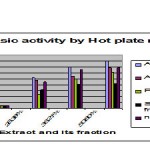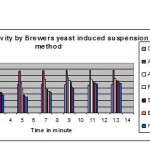How to Cite | Publication History | PlumX Article Matrix
N.G. Sutar1*, U.N. Sutar1, Y.P. Sharma1, I.K. Shaikh1 and S.S. Kshirsagar1
1 S.N.D. College of Pharmacy, Babhulaon, Tal- Yeola, District Nashik India.
ABSTRACT: Achyranthus aspera Linn. leaves have antimicrobial, anti-inflammatory, venereal affection, analgesic, antipyretic activity, in treatment of eyes, arthritis as antiirlityetc. Methanolic extract of leaves of Achyranthus aspera Linn. reported as analgesic activity but leaves till not reported, the effect of alcoholic extract and its various fraction as Petroleum ether, Ethyl acetate, Diethyl ether, n-Butanol were tested for phytochemically which contain glycosides, flavonoids, tannins, amino acids. As analgesic activity by using hot plate method and antipyretic by using brewers yeast induced method and compare with Aspirin as a standard in a dose of [25mg/kg] for analgesic and [125mg/kg] for antipyretic effect.
KEYWORDS: Leavess of Achyranthus aspera Linn; Analgesic activity by hot plate
Download this article as:| Copy the following to cite this article: Sutar N. G, Sutar U. N, Sharma Y. P, Shaikh I.K. and Kshirsagar S.S. Phytochemical investigation and pharmacological screening of leaves of Achyranthus aspera Linn. as analgesic and antipyretic. Biosci Biotechnol Res Asia 2008;5(2) |
Introduction
Achyranthus aspera Linn. [Amaranthaceae] is grown in India, in sub tropical parts of India. Western Himalayas. It is known as Prickly chaff flower in English, Chirchira in Hindi, Aghada in Marathi1. Dried leaves used in venereal affection, anti-inflammatory, purgative2, as tonic, The methanolic extract of leaves of Achyranthus aspera Linn.. reported to have analgesic activity but leaves till not reported the effect of alcoholic extract and its various fraction as Petroleum ether, Ethyl acetate, Diethyl ether, n-Butanol The aim of study was to screen effect of leaves of Achyranthus aspera Linn. as Analgesic and Antipyretic4.
Material and Method
The fresh leaves of Achyranthus aspera Linn. were collected. They were shade dried and ground to obtained coarse particles size. The powdered material was extracted with (95%) alcohol in a continuous hot extractor at 400-500c temps. Some part of the extract was kept aside and remaining was fractionated with Pet. ether, Ethyl acetate, Diethyl ether, and n-Butanol what ever the fraction collected was wash with water air dry and kept separately with Na2So3 ad dehydrating agent.5
Qualitative test were performed for the alcohol extract and its fractions alcohol extract showed the presence of glycosides, amino acids, and sterols. Pet. Ether extract showed presence of fats and oils 6,7
Evaluation of Analgesic and antipyretic activity
Hot plate Method
In this method Wister male albino rats (180-200gm) were used for the study. The animals were segregated into seven groups of six animals each.
Group 1 – Normal saline solution,
Group 2 – Aspirin as standard (25mg/kg),
Group 3 – Alcohol extract (30mg/kg)
Group 4 – Pet ether fraction (100mg/kg),
Group 5 – Ethyl acetate fraction (300mg/kg),
Group 6 – Diethyl ether fraction (300mg/kg),
Group 7 -n-Butanol fraction (300mg/kg).
The dried extract and its fraction were formulated as a suspension in distilled water. Alcoholic extract and its various fraction were administered orally using intragastic tube. The pain threshold (No. of liking of paw/jumping) were measured at 20, 60, 90 min after administration of standard and test solution 6,710.
Antipyretic activity
In this method Wister male albino rats (180-200gm) were used for the study. The animals were segregated into seven groups of six animals each. The standard and test group were fevered by brewers yeast suspension in propylene glycol [15%] at a dose of 10 ml/kg.
Group 1 – Normal saline solution,
Group 2 – Aspirin as standard (25mg/kg),
Group 3 – Alcohol extract (30mg/kg)
Group 4 – Pet ether fraction (100mg/kg),
Group 5 – Ethyl acetate fraction (300mg/kg),
Group 6 – Diethyl ether fraction (300mg/kg),
Group 7 -n-Butanol fraction (300mg/kg).
The dried alcoholic extract and its various fractions were formulated as a suspension in distilled water. Alcoholic extract and its various fractions were administered orally using intragastic tube. The rectal temperatures were measured at 30, 60, 90, 120 and 180 min. after administration of standard and test solution .11
Result
Analgesic activity and Antipyretic activity
Amongst alcoholic extract and its various fractions of leaves of Achyranthus aspera Linn. alcoholic extract showed potent analgesic and antipyretic activity which is comparable to that of aspirin at the dose of 25mg/kg. For analgesic and 125mg/kg. for antipyretic activity the peak effect in alcohol extract and fraction of leaves of Achyranthus aspera Linn... were seen after 1h.in case of analgesic and 0.5h.in antipyretic treatment This could be due to more availability of saponin as active principle’s in leaves.
Discussion
From this study, it can be concluded that the leaves of Achyranthus aspera Linn.. possesses marked analgesic and antipyretic activity and is equipotent to standard drugs. The present study establishes effectiveness and pharmacological screening, rational for use of leaves of Achyranthus aspera Linn. in folklore medicine as analgesic drug. Thus the plant can be further explored for its phytochcmical profile to identify the active constituent saponin is responsible for the above mention activities.
Table 1
| Sr No | Time
in min. |
Control
(vehicle) |
Aspirin | Alcohol extract | Pet.ether extract | Solvent
ether fraction |
Ethyl acetate fraction | n-Butanol fraction |
| 1 | 0 | 2.00±0.15 | 2.80±0.15
(4.44%) |
2.6±0.18
(3.35%) |
2.4±0.21
(2.27%) |
2.3±0.17
(2.22%) |
2.4±0.21
(2.27%) |
2.4±0.13
(2.23%) |
| 2 | 20 | 2.25±0.11 | 7.21±0.63
(28.38%) |
6.80±0.35
(25.63%) |
6.42±0.50
(23.84%) |
4.30±0.60
(11.54%) |
5.00±1.23
(15.49%) |
6.20±0.70
(22.25%) |
| 3 | 60 | 1.50±0.07 | 8.19±0.74
(36.21%) |
7.99±0.22
(35.13%) |
6.49±0.60
(27.02%) |
6.14±0.55
(25.13%) |
5.30±1.25
(20.54%) |
7.49±0.71
(32.43%) |
| 4 | 90 | 1.50±0.22 | 10.9±1.16
(50.8%) |
8.93±0.63
(40.17%) |
7.58±0.61
(34.32%) |
7.17±0.70
(30.65%) |
5.40±1.07
(21.08%) |
7.46±1.14
(34.25%) |
Table showing result of analgesic effect of Alcohol extract and its fractions of leaves of Achyranthus aspera Linn. on Hot plate method..
Table 2
| Group | Rectal Temp 0C | Time after medication in min | |||||
| Initial | 18 hr after
Yeast injection |
30 min | 60min | 90min | 120min | 180min | |
| Control | 38.30±
0.031 |
39.35±
0.025 |
39.30± 0.015 | 39.23± 0.025 | 39.20±
003 |
39.15±
0.038 |
39.00+
0.02 |
| Aspirin 150 mg/kg | 38.30±
0.073 |
39.35±
0.077 |
38.37± 0.025 | 38.09± 0.015 | 37.67±
0.053 |
37.58± 0.058 | 37.40+
0.47 |
| Alcohol 30mg/kg | 38.28±
0.022 |
39.37±
0.038 |
38.43± 0.022 | 37.87± 0.060 | 37.43±
0.044 |
37.30± 0.038 | 37.30+
0.38 |
| Pet ether 100mg/kg | 38.25±
0.058 |
39.39±
0.080 |
38.68± 0.051 | 38.00± 0.065 | 37.88±
0.057 |
37.70± 0.074 | 37.68+
0.72 |
| Solvent ether
300mg/kg |
38.27±
0.065 |
39.40±
0.012 |
38.80±
0.17 |
38.60± 0.11 | 38.40±
0.096 |
38.05± 0.10 | 38.00+
0.7 |
| Ethyl etate. 300 mg/kg | 38.24±
0.080 |
39.38±
0.10 |
38.67±
0.13 |
38.50± 0.069 | 38.40±
0.086 |
38.35± 0.080 | 38.30+
0.85 |
| n-Butanol 300mg/kg | 38.26±
0.065 |
39.40±
0.051 |
38.75± 0.11 | 38.61± 0.060 | 38.58±
0.065 |
38.40± 0.052 | 38.37+ 0.072 |
Table showing result of antipyretic effect of Alcohol extract and its fractions of leaves of Achyranthus aspera Linn. by Brewers yeast induced pyrexia method.
 |
Figure 1
|
 |
Figure 2
|
References
- Pal, D., Panda, Co, Datta, A., Babu, S.S., Laha, D., Sedative and analgesic activities of the Pet. Ether extract of Cuscuta reflexa Roxb. Stem in mice, Presented in 55th IPC Chennai, 2003,245.
- Prajapati, N.D., Dr. Purohit, S.S., Sharma, A.K., Kumar, T., In; A Hard Book of Medicinal Plant A Cpmplete Source Book, 1st edition, Agrobios, Agro house, Behind Nasrani Cinema, Chopasani Road, Jodhpor, 2003,218.
- Rao, C.V., Ojha, S.K., Analgesic effect of Achyranthus aspera ..leaf extract on rats, 2nd World Congress on “Biotechnological Developments of Herbal Medicine”. NBRI, Lucknow, UP, India, 42. (MAPA 2003-02-911)
- Parrota, John.A., In; Healing Plants of Peninsular Indian, CSBI publishing 2001,53,528-529.
- P. Rastogi; Mehrotra,B.N; Compendium of Indian Medicinal Plants Central Drug Research institute Lucknow and National institute of Science communication, New Delhi vol-I, p 280
- B. Patil; S.S. Jalalpure; H.J.Pramod; Anti inflammatory activity of Anacardium occidentle leaves Indian J. of Pharmaceutical Sci. Jan, Feb,70,2003.
- Kokate, C.K. “Practical Pharmacognory”. Delhi, Villabh Prakashan, 1994, IVth edition, 110 pp.
- Raphael IK, Natural products, A laboratory guide 2nd edition, Harcourt BraceJovanovichPublishers,pp279, 281.
- D. Shethi, Identification of Drugs in Pharmaceutical formulation by Thin Layer Chromatography C.B.S.Publisher, 2nd edition.
- Vogel, H.G., Eds., Drug Discovery and Evaluation Pharmacological Assays 2nd edition, Springer-Verlager Berlin Heidelberg, New York, 2002,696-697,772.
- Vogel, H.G., Eds. Drug Discovery and Evaluation Pharmacological Assays 2nd edition, Springer-Verlager Berlin Heidelberg, New York, 2002,696-697,692.

This work is licensed under a Creative Commons Attribution 4.0 International License.





